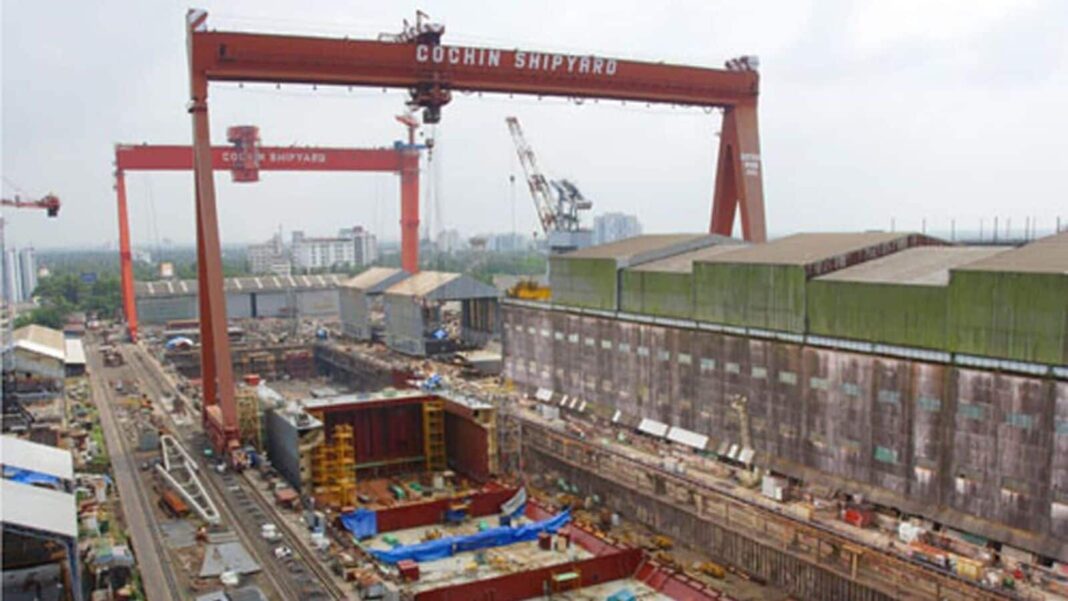In Short:
India is actively seeking investments from South Korean and Japanese shipbuilders to become a global shipbuilding hub. The country’s goal is to rise from 22nd to among the top 10 shipbuilding nations by 2030. India plans to establish shipbuilding parks and has proposed initiatives to enhance domestic shipbuilding and repair, while also expanding recycling facilities to boost its global market share.
India Sets Sail for Global Shipbuilding Dominance
India is charting a course toward becoming a significant player in the global shipbuilding arena, making waves by seeking investments from **Korean** and **Japanese** ship manufacturing giants.
Delegation’s Mission to South Korea and Japan
Recently, an Indian delegation met with key stakeholders in **South Korea** to gauge their interest in investing in shipbuilding and repair facilities within India’s proposed mega shipbuilding parks. Plans are in the works for a similar visit to **Japan** to explore opportunities in the shipbuilding sector.
Investment and Technology Transfer
“We are keen on establishing shipbuilding infrastructure, particularly engaging with South Korea for both funding and technology transfer. We’re also pursuing similar discussions with Japan,” highlighted **T.K. Ramachandran**, Secretary of the Ministry of Ports, Shipping, and Waterways.
Aiming for the Top
The ministry aims to elevate **India** from its current ranking of 22nd in global shipbuilding, with aspirations to break into the top 10 by 2030, and the elite top 5 by 2047.
Support from Coastal States
Ramachandran further shared, “Three coastal states have already stepped up, expressing their willingness to allocate land for a shipbuilding and repair cluster. We’re now on the lookout to partner with companies to establish this cluster.”
The Road Ahead for Domestic Shipbuilding
**Pushpank Kaushik**, CEO of **Jassper Shipping**, a Singapore-based shipping and logistics provider, emphasized the significance of domestic shipbuilding in achieving the government’s goal of controlling at least 5% of global tonnage—up from the current less than 1%. “Without a robust local industry, we won’t reach our targeted economic growth and development,” he remarked.
Aiming for a New Era: India’s Shipbuilding “Maruti Moment”
In a bid to replicate the automobile industry revolution sparked by **Suzuki Motor Corp** in the 1980s, India is looking to invite global shipbuilding titans such as **Hanwha Ocean Co. Ltd** and **Samsung Heavy Industries** from South Korea, as well as **Mitsubishi Shipbuilding Co. Ltd** and **Mitsui Engineering and Shipbuilding** from Japan. “These companies are all potential candidates to establish shipbuilding and repair facilities in India,” stated Ramachandran.
Finalizing a Robust Shipbuilding Mission
The Indian government is in the final stages of launching a comprehensive shipbuilding mission designed to enhance the country’s shipping infrastructure and create a supportive ecosystem, complete with beneficial policies and incentives.
Amrit Kaal Vision 2047: Key Initiatives
As part of the **Amrit Kaal Vision 2047** action plan, the **Ministry of Shipping** has identified 17 pivotal initiatives to bolster shipbuilding, repair, and recycling within India. This includes extending current shipbuilding policies for an additional 5-10 years beyond 2025-26 and advocating for **Atmanirbhar Bharat** (self-reliant India) policies, such as prioritizing Indian flag vessels for governmental needs.
Expanding the Ship Recycling Framework
In conjunction with shipbuilding and repair, the government aims to expand initiatives for ship recycling, including bolstering the **Alang Shipyard**, leveraging vehicle scrapping policies, and developing new ship recycling hubs in **Andhra Pradesh**, **Odisha**, and **West Bengal**.
Vision for a Thriving Shipbuilding Ecosystem
The vision delineated in the **Amrit Kaal Vision 2047** plan emphasizes the necessity for a robust shipbuilding ecosystem, underpinned by adequate infrastructure and supportive policy frameworks, to position India as a leader in the shipbuilding, repair, and recycling industries.
Competition in the Global Market
As detailed in the **Maritime Vision 2030** document by the Indian shipping ministry, the global shipbuilding market is approximately valued at **$70 billion**, with **China**, **South Korea**, and **Japan** dominating the scene. Meanwhile, the global ship repair market stands at about **$12 billion**.
A Historical Perspective
Back in the early 2000s, India was among the top 10 producers globally, boasting vessel capacities exceeding 300,000 gross tonnage. However, a global downturn severely impacted Indian shipyards, and the country’s share in the global market dwindled to below 1%.
Current Landscape of Indian Shipyards
Today, India houses **28 shipyards**, with six under central public sector management, two by state governments, and 20 operated by private entities. While India is a key player in ship recycling, claiming about **25%** of the global market, it faces rising competition from countries like **Bangladesh** and **Pakistan**.
Challenges in the Ship Repair Market
Shipyards in regions like **China**, **Singapore**, **Bahrain**, and **Dubai** command significant portions of the global ship repair market, largely due to their skilled workforce and cutting-edge technology, commonly attracting demand away from lower-cost countries like **Malaysia**, **Indonesia**, and **India**.





